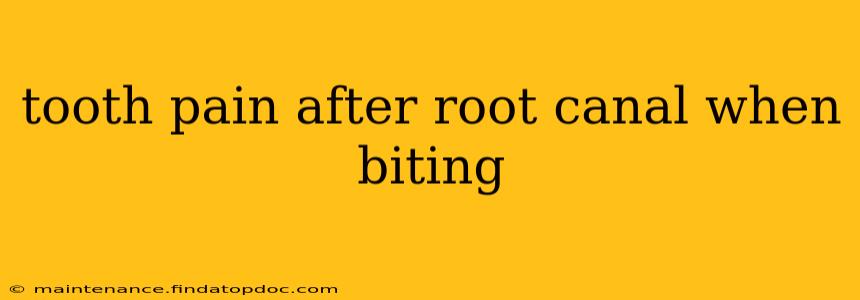Experiencing tooth pain after a root canal, especially when biting down, can be frustrating and concerning. While root canals are highly successful in saving teeth, post-procedure discomfort isn't entirely uncommon. This comprehensive guide will explore the potential causes of this pain, when to seek professional help, and what you can expect during the healing process.
Why Does My Tooth Hurt After a Root Canal When I Bite?
Several factors can contribute to persistent tooth pain after a root canal, even when biting gently. These often relate to the procedure itself or subsequent complications. Understanding these reasons is crucial for effective management.
Incomplete Root Canal Treatment:
Sometimes, not all infected tissues are removed during the root canal procedure. Remaining bacteria can cause inflammation and subsequent pain, especially when pressure is applied through biting.
Infection or Reinfection:
Despite meticulous cleaning, bacteria might find their way back into the tooth, leading to a reinfection. This can manifest as throbbing pain, especially when pressure is applied.
Cracked Tooth:
A pre-existing or newly developed crack in the tooth can cause pain, particularly with biting pressure. The crack might not have been immediately apparent before or during the root canal.
Sinus Infection:
A sinus infection can sometimes cause referred pain in the upper teeth, mimicking the sensation of a toothache, especially when biting.
Issues with the Filling or Crown:
An improperly fitted temporary or permanent filling or crown can put excessive pressure on the treated tooth, leading to pain when biting. The crown may not be perfectly aligned, leaving gaps that can be sources of sensitivity.
Other Dental Issues:
Pain could be stemming from a different source altogether, such as issues with adjacent teeth, gum inflammation (gingivitis or periodontitis), or temporomandibular joint (TMJ) disorder.
How Long Should Tooth Pain After a Root Canal Last?
The duration of post-root canal pain varies. Mild discomfort for a few days to a week is often considered normal as the tissues heal. However, persistent or worsening pain warrants immediate dental attention.
What Should I Do If My Tooth Still Hurts After a Root Canal?
If you experience persistent or worsening pain after your root canal, contact your dentist immediately. Don't attempt to self-treat. They can accurately diagnose the problem and recommend the appropriate course of action, which might include:
- Medication: Pain relievers, antibiotics (if infection is suspected), and anti-inflammatory drugs may help manage symptoms.
- Additional Procedures: A retreatment (if there's incomplete cleaning or reinfection), apicoectomy (removal of the infected tip of the root), or extraction (in severe cases) might be necessary.
- Adjustments: If the pain is caused by an ill-fitting crown or filling, adjustments or replacement might be required.
Can a Root Canal Fail?
While highly successful, root canals can sometimes fail due to the reasons listed above. Failure doesn't necessarily mean the procedure was improperly performed, but rather that unforeseen complications arose.
Is My Tooth Pain Normal After a Root Canal?
Mild, temporary discomfort is normal. However, severe, persistent pain, swelling, or any other alarming symptoms are not normal and require immediate professional assessment.
How Can I Prevent Tooth Pain After a Root Canal?
Following your dentist's post-operative instructions meticulously is key. This usually includes:
- Taking prescribed medication as directed: This helps manage pain and inflammation.
- Avoiding biting on the treated tooth: Give the treated area ample time to heal.
- Maintaining good oral hygiene: Brush and floss gently, ensuring the area is clean.
- Regular dental check-ups: This allows for early detection of any potential problems.
Remember, prompt attention to any post-root canal pain is crucial for successful treatment and preventing further complications. Don't hesitate to contact your dentist if you have any concerns.
